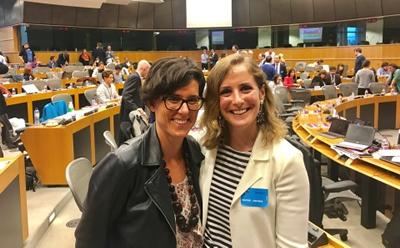iCLIC conference “Better Regulation for Copyright: When Academics meet Policy Makers"

iCLIC members Sophie Stalla-Bourdillon Eleonora Rosati co-organised the conference “Better Regulation for Copyright: When Academics meet Policy Makers” together with the Greens/EFA Party led by MEPs Julia Reda (see https://juliareda.eu/events/better-regulation-for-copyright/). The event was hosted by the European Parliament in Brussels. Three panels debated topics at the heart of the new copyright reform: the neighbouring right for press publishers, platform liability, and copyright on data before a room fully packed with policy makers, researchers, academics, activists, journalists, and representatives of the industry and students (including from the University of Southampton) alike.
Commissioner Mariya Gabriel for Digital Economy and Society delivered the keynote speech focusing on the needs of the Digital Single Market. Merili Oja, Counsellor for Judicial Affairs at the Permanent Representation of Estonia to the EU, expressed the views of the Council Presidency on the neighbouring right for press publishers, while Axel Voss (EPP) Rapporteur for Copyright in the Digital Single Market in the JURI committee of the European Parliament insisted on the necessity to find solutions to solve the value gap conundrum and Giuseppe Abbamonte, Director for Media Policy, European Commission, DG CONNECT – Communication Network, Content & Technology, stressed the importance of finding a way to give data owners an incentive to share their data.
Eleonora spoke on the neighbouring right for press publishers and Article 11 of the proposed copyright Directive in the Digital Single Market, discussing the policy shift from a new neighbouring right towards a presumption of representation. Sophie spoke about filtering obligations and Article 13 of the same proposed copyright Directive, arguing in favour of acknowledging the human rights concerns raised by the imposition of filtering obligations in order to find a more balanced and process-based solution for the use of content recognition technologies and preserve the freedom of expression and the right to privacy of end users.
A video of the conference is available here as well as the conference proceedings, which can be downloaded here.